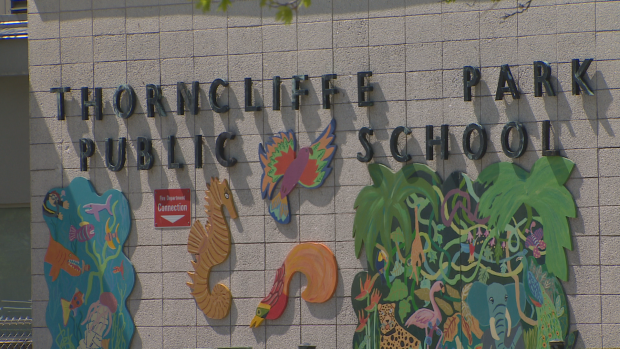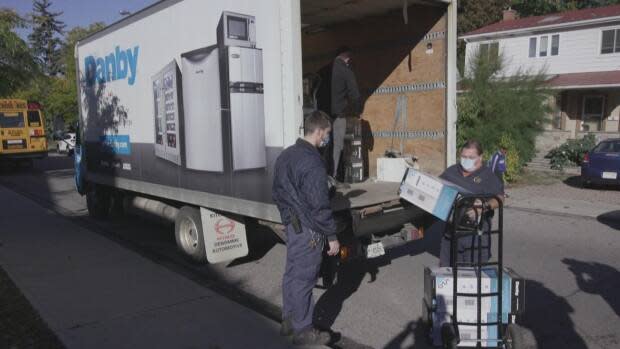School boards prepare for returning students as debate rages over safety
With the return of some Ontario students to the classroom set for less than three weeks away, opinions on whether classrooms are as safe as they should be are piling up.
The provincial government told CBC Toronto its plan to reopen Ontario's schools "has been informed by the best medical and scientific minds in the country, including SickKids and other hospitals."
In-person classes are set to re-start in Toronto, Peel, Hamilton, Windsor and York on Feb. 10. A number of other boards still haven't been told when they'll resume.
Among the new measures greeting students upon their return: adding mask requirements for Grades 1 to 3, expanding voluntary asymptomatic testing, and continuing to fund HVAC and ventilation improvements — though the government says at least 95 per cent of schools have already had upgrades.
Meanwhile, the plan to reopen — and the province's approach to school safety in general — continues to draw mixed reactions and sharp criticism.
Adalsteinn Brown, dean of the University of Toronto's Dalla Lana School of Public Health and co-chair of Ontario's COVID-19 science advisory table, told CBC Radio last week that "the decision about opening schools has to be taken very, very carefully."
Students mixing and spreading the disease "could be very dangerous," he continued.
Responding to a recent Toronto Star article that reported that the province had ignored or dialled back several pieces of school safety advice, the Ontario NDP took a harder line.
"Parents, teachers, education workers and children are living with anguish, frustration and fear," the party wrote in a statement, adding that the Premier "chose saving money over saving kids' health and their education."
The province has also been roundly criticized by teacher's unions, both for the revelations in the Star article and for a perceived failure to be included in the planning process.
"What we're asking for is to have an advisory table where all of the stakeholders are there where the government will actually pay attention," said Liz Stuart, president of the Ontario English Catholic Teachers Association, in an interview with CBC Toronto.
SickKids guidance says closures are 'last resort'
One element of the return to school that is not being debated: the importance of getting students back into physical classrooms.
In its updated guidance for re-opening, put out this past Thursday, SickKids wrote that the suspension of in-person learning should be "a last resort for pandemic control" given the "significant negative impact" it can cause.
That negative impact — and the blanket closure — was also the subject of another criticism levelled at the government last week, this time from a group called "Opening Schools & Daycares Full Time Safely In Ontario."
"The most significant harm your Government has done is the universal closures of schools regardless of the rate of COVID in each school's community," the group wrote in its statement.
On Monday, seven health units will send students back to physical classrooms, something infectious disease expert Dr. Zain Chagla is welcoming, given the low rates of community transmission in those regions.
"This is a time to restart schools and track what actually happens in the next two to four weeks," he said in a recent interview with CBC News. "We can't keep… saying schools are the issue and shutting them down."
School boards prepare
For school boards looking ahead to a Feb.10 opening, the task now is to prepare to roll out the new measures.
Dawn Danko, chair of the Hamilton-Wentworth District School Board, says she's grateful to have time to iron out the details.
Take asymptomatic testing — first introduced as a pilot project in some Ontario hot spots back in November — now being brought to new areas, including Hamilton.
Danko is glad to hear it's coming, adding that "what we need time to do here is talk to local public health. How do we operationalize that, who does the testing?" she told CBC Toronto.

The same goes for confirming the details around new forms families will likely have to sign — possibly every day.
As for HVAC improvements, Danko says proactive work in the summer and early fall means every HWDSB school has been inspected, with HEPA air filters installed in classrooms where ventilation could not be improved.
Forty new custodial staff members were also hired, she said, though there are plans to hire even more staff this winter.
"We're in a really good position in terms of our facilities being updated," she said.
The Toronto District School Board is also feeling confident about the return, writing to CBC Toronto in an email that they "have taken a number of important steps since the beginning of the school year."
HVAC repairs and improvements largely carried out in the fall
CBC Toronto e-mailed the province and all four GTA school boards to ask how much work had been done on their HVAC and ventilation systems to this point.
The Toronto District School Board says that every school and instructional space has been reviewed, and that any classroom without mechanical ventilation has had a HEPA filter installed.
(The most recent SickKids guidance says there is "insufficient evidence" to routinely recommend the filters, though they can be considered in situations where there's limited ability to improve ventilation in other ways.)

In the Halton District School Board, as of November 2020, all HVAC equipment filters have been upgraded, and HEPA filters are also being used in classrooms. In all, 397 new air filtration units have been installed in schools.
At the Peel District School Board, "100 per cent of our classrooms have been reviewed and upgraded in some capacity," wrote a spokesperson, adding that the work was helped along by $3 million from the province.
Peel is also using nearly 1000 portable filters. A more thorough overhaul via system recommissioning has been completed at four sites and is being worked on at 32 others.
York Region District School Board did not respond to the CBC's request.

 Yahoo Finance
Yahoo Finance 